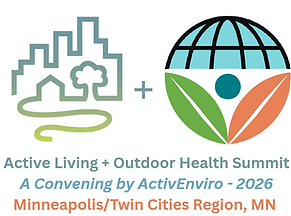2026 AL+OH SUMMIT
Registration NOW Open.
Join us for the 2026 Active Living + Outdoor Health (AL+OH) Summit, a week of learning, collaboration, and inspiration exploring how physical activity and connection with nature can strengthen lives, communities, and planetary health.
ABOUT THE SUMMIT
The Active Living + Outdoor Health Summit 2026 combines the best elements of the former Active Living Conference and the Global Outdoor Health Summit into a unified, multidisciplinary event. Grounded in the theme Stronger Together: Transforming Lives, Communities, and Planetary Health, the Summit explores how physical activity and nature experiences-both indoors and outdoors-can support preventive health, well-being, equity, and environmental sustainability.
The Summit provides opportunities for dialogue, shared learning, and collaboration across sectors including public health, planning, parks and recreation, tourism, environmental science, community development, academia, and allied organizations. Sessions will highlight research, policy, and practices that advance active living and outdoor engagement as strategies to improve quality of life, social connection, mental and physical health, and environmental resilience.
REGISTRATION
Registration includes access to all sessions, networking events, and Summit experiences. Early registration is encouraged to secure your spot and take advantage of discounted rates.
Early Bird rates available through January 15, 2026.
Ticket Type Early Bird Standard
(by Jan 15) (after Jan 15)
General $599 $699
Speakers & Nonprofit $549 $549
Student $349 $399
Pricing Details
All prices include processing fees covered by ActivEnviro - what you see is what you pay.
Group Discounts
Groups of three or more receive a 10% discount. Contact us for the registration code. All registrations must be booked at the same time. For groups of ten or more, please contact us directly.
select your 2026 AL+OH SUMMIT EXPERIENCeS during registration
Organized by the AL+OH Experiences Committee in Partnership with Three Rivers Park District and other local host partners.
There will be a variety of indoor and outdoor Experiences of various levels of exertion, activity, and educational aspects included in your registration fee offered during set aside time blocks on Tuesday and Thursday. These help us "walk the talk" and provide inherent strong social networking, physical, and mental wellbeing benefits. Please plan to participate (and bring appropriate clothing for weather changes if outside). Here are some examples you may be asked to choose from during registration:
Thursday, March 12, 1:00 - 4:00 PM
THURS1. Maple Syruping, Climate Change, and Forest Resiliency
Led by: Anne Jaeger
Where to Meet: Eastman Nature Center, Elm Room
Description: People should wear appropriate clothing for the weather (layers are recommended), sunglasses, a hat, and comfortable shoes. Trails can be muddy this time of year. There will be indoor portions and outdoor portions including tasting maple syrup, cooking maple sugar, basic tree biology and winter tree identification, looking at tree health and signs of stress, aging a tree, hauling sap, and seeing our cauldron cooking set-up.
Items to Bring: Your sense of curiosity!
Maximum Number of Participants: 40
THURS2. Mindfulness Walk in Nature
Led by: Leah Manuel & Nicole Fernandez
Where to Meet: TBD
What to Wear: Participants should wear appropriate clothing for the weather (layers are recommended), sunglasses, a hat, and comfortable shoes.
Items to Bring:
Comfortable walking shoes suitable for natural terrain
Weather-appropriate clothing (layers, rain jacket, hat, etc.)
Water bottle to stay hydrated
Bug repellent and sunscreen, if needed
Small backpack to carry personal items
Journal or notebook (optional, for reflection)
Maximum Number of Participants: 25
Description: Take a gentle, guided walk through a natural setting designed to help you slow down, reconnect with your senses, and cultivate presence. This mindfulness walk in nature encourages participants to experience the outdoors in a calm, intentional way—through quiet observation, breathing exercises, and simple practices that deepen awareness. Suitable for all fitness levels, the session offers a refreshing pause from daily routines, supporting mental clarity, stress relief, and a deeper connection to the natural world.
THURS3. V3 Sports Facility and Programming Experience
Led by: Dr. Ayanna Rakhu, Molly Belk, Dajah Godbolt
Where to Meet: V3 Sports, 701 Plymouth Ave N, 55411
Timing: 1-3:15pm (shorter session to allow for transition to 4pm poster session)
What to Wear: Comfortable clothes to start–will start on land and transition to water
Items to Bring: Towel, something comfortable to swim in, goggles (optional)
Maximum Number of Participants: 40
Description: Join us at V3 Sports for an immersive event highlighting our vision and community impact, and innovative programming. Guests will enjoy a tour of our facility, learn about the future for V3 Sports, and explore our current initiatives in partnership with Three Rivers. Following the tour and a brief classroom overview of V3 Sports aquatics programs, participants will take part in an energizing aqua Zumba class led by Dajah Godbolt. We will wrap up the experience in the water with our Swim Guides providing a hands-on introduction to our Swim to Learn teaching approach.

Date:
March 8 -13, 2026
Location:
Minneapolis, MN



